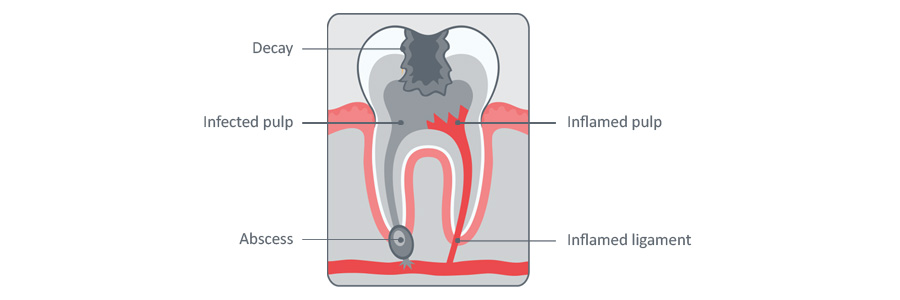
Almost every person experiences pain in the teeth and gums at some point in their lives. This is known as dental pain. Dental pain is often characterised as a constant throbbing pain, but in some cases it can even be episodic, i.e. it may come and go. The pain can occur with a vengeance at night, or when one eats or drinks something hot or cold. Dental pain is not always felt in the teeth, sometimes the pain can spread to the face and jaw.
TOOTH DECAY IS ONE OF THE MOST COMMON CAUSES OF DENTAL PAIN. HOWEVER, A TOOTHACHE CAN ALSO BE CAUSED BY:
- A cracked tooth
- Loose or broken fillings
- Receding gums: more sensitive parts of the tooth that are not protected by enamel are exposed
- A tooth or jaw infection
- Wisdom teeth growing out of the gums
- Wearing braces
- Clenching or grinding your teeth
- Sinus congestion: this feels like a toothache, just like a toothache sometimes feels like sinus pain

WHY DO I GET DENTAL PAIN FROM TOOTH DECAY?
Teeth are composed of 3 layers – the outermost one is the hard enamel, followed by a softer layer below, and then a soft centre called the ‘pulp’ which has the nerves and blood vessels. When decay wears through the harder outer layers and reaches the pulp, it comes in contact with the exposed nerves, thus causing pain. The pulp can also get inflamed or infected, and you may need to undergo a root canal procedure to remove it. This is why it is important to visit the dentist if you have dental pain for more than two days. The longer you take to see the dentist, the more the infection will spread inside the tooth and gums.
PREVENT DENTAL PAIN BY TAKING GOOD CARE OF YOUR TEETH
- Brush your teeth regularly. Do this twice a day with a medium or soft brush. Also brush the gums and tongue along with the teeth
- Choose a toothpaste fortified with fluoride. This helps if you have sensitive teeth
- Clean between the teeth with dental floss or interdental brushes to remove trapped food particles and plaque
- Use a fluoride-based mouthwash. However, do not use it right after brushing your teeth
- Avoid consuming sugary foods and drinks
- Don’t smoke
- Chew sugar-free gum to stimulate saliva production
- Visit your dentist every 6 months for check ups
WHAT SHOULD I DO TO RELIEVE A TOOTHACHE?
The dentist is the most qualified person to diagnose the cause of your toothache. It’s especially important to see a dentist if you are in severe pain, instead of hoping that it will go away on its own. You should also seek advice as soon as possible if you have tooth pain accompanied by fever, or if you feel unwell, or if the tooth pain was caused by an injury.
Over-the-counter pain relievers can also ease the pain until you see your dentist.
